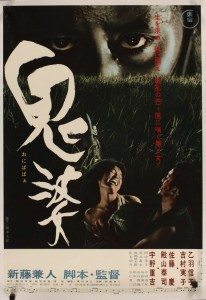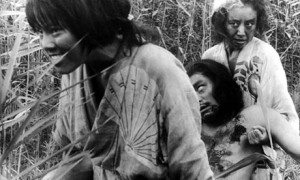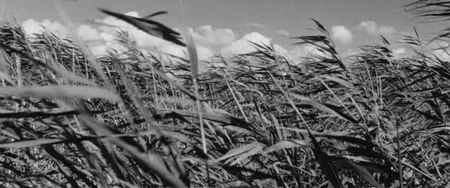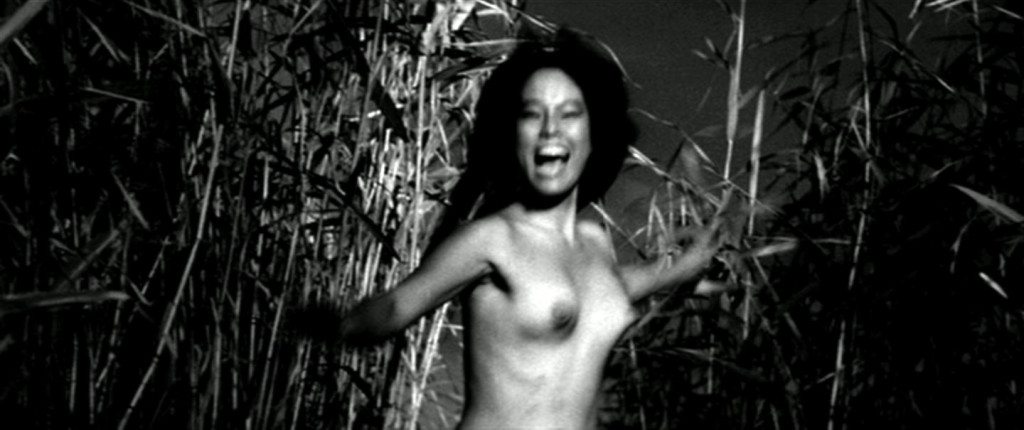 You know what can be really frightening? No. Don’t guess. It’s a trick question.
You know what can be really frightening? No. Don’t guess. It’s a trick question.
That’s because once you know the answer, it’s no longer frightening; it’s just your face in the mirror. Or maybe that is frightening? Maybe, without you noticing it happening, you’ve become horribly deformed? Maybe you’ve become some sort of demon hag?
The unknown, see, those devils that lurk within us and which emerge as greed and lust and violence — those are the frightening thing in Kaneto Shindo’s 1964 film Onibaba.
Onibaba came to my attention as one of my favorite film reviewers called it the scariest film he’d ever seen. Having watched it, I can’t second that claim, but I can encourage you to find time for it. It’s a haunting, atmospheric, nasty little fable that makes you want to mow the lawn down to the dirt.
The film takes place in 14th century Japan, during a period of civil war. Two competing emperors battle it out with armies of samurai and conscripted soldiers, regardless of the cost to the country. Casualties of the war start the story, escaping from mounted pursuit into an endless field of enveloping susuki grass. Its lacerating edges and looming height swallow the men. Collapsing in exhaustion, they shelter in a clearing created by the weight of their bodies. They do not last. Two women — never named — kill them with spears. They emerge from the camouflaging reeds to strip the corpses of their valuables and to then toss them down a deep, dark hole.
This is their job.
As we learn, the middle-aged woman and the young woman lost their son/husband to conscription. They survive now only by slaughtering the unwary and weak. The irony of their despair at losing their own loved one to war while they profit off the loss of others seems to pass them by, but then times are truly hard. They cart their haul to fence who pays them in bags of millet. Even that is a challenge to come by now that all the farmers are dead or in hiding.
Onibaba is filmed in a slow, high contrast, black & white style that favors extreme close-ups and lingering looks at grass waving in the wind. It is not a natural look, and yet it feels insidious and familiar. You are mesmerized by the inhalations of the field, the sweep of probing eyes, the casualness of murder.
The soundtrack, too, plays tricks on you. The score is delicately pared back, only adding highlights of choral creepiness when you’ve forgotten music exists. Often there is just silence. Time to think, as it were, about what is hiding in the grass or lurking down the hole.
Complication comes in the form of a hungry neighbor. Conscripted alongside with the women’s husband/son, he has managed to escape, casually relating that their loved one is dead. He reoccupies his nearby hut and quickly insinuates himself both into their violent profession and into the freshly available arms of the younger woman. The older woman sees the threat in this. If the younger woman leaves, she will be unable to murder without her. She will therefore starve.
Layers of want. Overwhelming, wanton desire pushing aside all semblance of propriety or morality. This is Onibaba. It is the ravenous grasping that consumes us from the inside.
Onibaba is also a look in the mirror after we’ve done what we thought we had to. What is reflected back? Do demons lurk out there amid the grass — or is it only your own face you see?
There is more to the story of Onibaba. There is a samurai. There is a mask. There is screaming and sex and stark flashes of blinding bright to cut through the dark. In the end, there is also the ravenous hole. It has always been there and it will always remain.
If you like Onibaba, you might want to also take a look at Hiroshi Teshigahara’s Woman in the Dunes, Roman Polanski’s Repulsion, and/or John Frankenheimer’s Seconds. In various ways, those films all remind me of this hard to classify Japanese meditation on the wilds within our heads.





